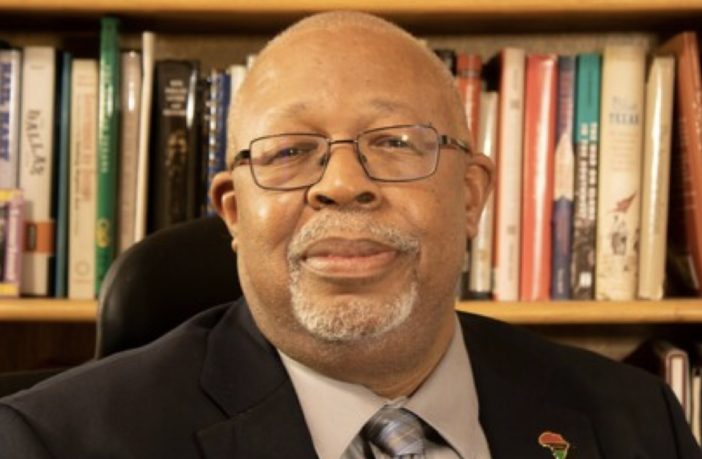For social justice advocates and educators like Dr. W. Marvin Dulaney, the benefit of the long view is invaluable.
“Black Resistance” is the 2023 theme for the Association for the Study of African American Life and History. (Courtesy of ASALH)
As a student at Ohio State University and a member of the Black Studies Movement in 1973, Dulaney, national president of the Association for the Study of African American Life and History (ASALH), said he focused on law enforcement, eventually writing the book “Black Police in America.” Published in 1996, the book looks closely at policing in America up to that point and offers a series of solutions.
“I was looking at what we’d done. I said we need more Black people in police departments,” Dulaney, recalled with a wry chuckle. “I wrote a whole book about it. Black people thought that if we have Black police officers, and if they lived in our communities, they would protect people, administer fair, authoritative and equitable justice, go after criminals, make the community safe.”
“But with integration, Black men and women moved out of the community.”
What Dulaney and other civil rights and social justice reformers didn’t count on was that the police institutions and structures that African-American men and women joined would change them. Some would act no differently from their white counterparts and other Black officers seeking meaningful change faced ostracism and danger to themselves if they spoke out and a host of other dangers.
America is seeing the absolute worst outcome of these realities with the recent murder of Tyre Nichols, a 29-year-old who was beaten to death by five Black Memphis police officers after a Jan 7 traffic stop.
“The Tyre Nichols incident blows me away. It destroyed everything we thought integrating police departments would do,” said Dulaney, who retired from teaching in 2016 after 42 years in the classroom and who served as deputy director and chief operating officer for the Dallas African American Museum.
Over the past few years, Dulaney said ASALH represents the adage, “plus ça change, plus c’est la même chose” – the more things change, the more they remain the same.
“Obviously, there’s a lot going on. We focused on the fact that we’re still fighting the same old battles in the classroom and attempts by Republicans to take away our vote,” said Dulaney, who served as a consultant on African and African American history curricula with the Fort Worth and Dallas Independent School Districts. “All of this is going on: a constant attempt to turn the clock back. All this stuff is just constant. It keeps you on edge.”
This year’s theme, “Black Resistance,” is deliberate, Dulaney said.
As ASALH notes, “African Americans have resisted ancient, pervasive and ongoing oppression during their sojourn in the United States,” including what ASALH describes as “the racial terrorism of lynching, racial pogroms, and police killings,” since African Americans arrival upon these shores.
“These efforts have been to advocate for a dignified self-determined life in a just democratic society in the United States and beyond the United States political jurisdiction,” the organization explains.
Dulaney said ASALH, a legacy organization founded by Carter G. Woodson in 1915 to promote Black history, has “been constant.”
With white supremacy and MAGA extremist backlash pervasive, Dulaney and ASALH have advice: resistance.
“As [Maryland-born Black abolitionist and minister] Henry Highland Garnet said, ‘let your motto be your resistance!’ Fortunately, we don’t have to work so hard. We have the methodology and ways to resist and we do have laws and institutions that will help us to resist,” he said.
In Black history, the continuum of resistance included establishing colleges and universities, hospitals, clinics, nursing schools so Black people can get quality health care, marches, demonstrations, boycotts, sit-ins and lobbying elected officials. The ASALH website explains that African Americans devised “ways to nurture and protect Black lives,” such as “voluntary emigration, nonviolence, education, music, literature, sports, media, and legislation/politics.”
Resistance is also witnessed through Black-led institutions and affiliations lobbying, litigating, legislating, protesting and achieving success.
ASALH and similar organizations fight for justice by vigorously pushing back against racism, racial intolerance and discrimination in every segment of society ranging from housing, employment and education. At every step, African Americans and their allies have had to unswervingly push, coax and cajole America to live up to the ideals the country purports to represent: freedom, liberty, and justice for all.
Dulaney also emphasized the intimate intertwining of Black churches and institutions where congregants organized resistance efforts served as safe spaces and source of inspiration for citizens who joined various movements and took advantage of sanctuary in times of danger and crisis.
“That’s how we resisted in the past, running away, starting our own churches, starting the NAACP and national women’s organizations,” Dulaney said.



